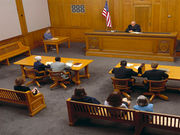Second policy statement develops recommendations for pediatricians relating to expert testimony
TUESDAY, Feb. 21, 2017 (HealthDay News) — In two policy statements published online Feb. 20 in Pediatrics, guidance is provided for safeguarding the well-being of child witnesses, and recommendations are given for pediatricians relating to expert testimony.
Noting that children are increasingly serving as witnesses in courts, Robert H. Pantell, M.D., from the University of California, San Francisco, and colleagues updated the policy statement relating to children in courts, with a goal of reducing the secondary traumatization of and long-term consequences for children providing testimony about violence they have experienced as victims of physical or sexual abuse or as witnesses of violent acts. The American Academy of Pediatrics recommends application of developmentally appropriate and scientifically effective methods for addressing child witnesses and allowing only qualified and experienced individuals to question children. Confidentiality should be maintained before, during, and after courtroom appearances. Therapies should be provided for traumatized children, including victims and witnesses.
In the second policy statement, Stephan R. Paul, M.D., J.D., from West Virginia University in Morgantown, and colleagues provide recommendations for pediatricians to improve expert testimony. The authors note that the best strategies for improving the quality of medical expert witness testimony include strengthening the qualifications for serving as a medical expect, educating pediatricians about ethical practices and standards for expert testimony, and supporting regulation and disciplinary efforts.
“[This policy statement] bolsters the requirements for expert testimony and provides new guidance on ways to prevent irresponsible testimony in medical liability proceedings as well as in child abuse cases,” Paul and colleagues write.
Policy Statement 1
Policy Statement 2
Copyright © 2017 HealthDay. All rights reserved.








